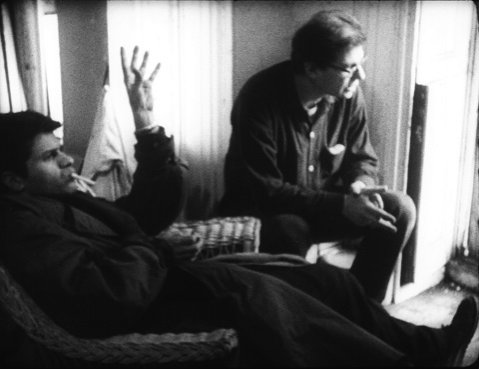Screen/Society--AMI Showcase--Short Films by Robert Frank

Works to be screened:
Pull My Daisy
(1959, 28 min, digital)
Pull My Daisy is a classic look at the soul of the beat generation, made with writers Jack Kerouac and Allen Ginsberg, and painters Alfred Leslie, Larry Rivers, and Alice Neel. It was written and narrated by Kerouac, based on his unproduced play The Beat Generation. It tells the story of a bishop (Richard Bellamy) and his mother (Alice Neel) who pay a visit to Milo, a railroad worker. At the same time his poet friends, Ginsberg, Peter Orlovsky, and Gregory Corso, hang around quizzing the bishop about the meaning of life and its everyday relationship to art and poetry. Pull My Daisy is recognized as one of the most important works of avant-garde cinema.
OK End Here
(1963, 33 min, digital)
O.K. End Here is about a day in the lives of a man and woman who live together in New York City. It is Sunday, a day without the distractions that keep people from facing each other and themselves. O. K. End Here won the grand prize at the 1963 Bergamo Film Festival.
Flamingo
(1996, 5 min, digital)
Frank’s poetic diary (with voiceover narration) recording the construction of a new foundation for his house in a remote area of Cape Breton, Nova Scotia; it silently describes the need to keep working in the face of nature and time.
I Remember
(1998, 4.5 min, digital)
Frank narrates a charming re-enactment of his visit to the home of Alfred Stieglitz. The cast comprises June Leaf as Georgia O'Keeffe, artist Jerome Sother as Robert Frank, and Frank himself in the role of Stieglitz.
Tunnel
(2005, 4 min, digital)
Commissioned to premiere under the Swiss Alps at an event held during final blasting through the midpoint of the 21-mile Lotschberg Tunnel in 2005.
About the filmmaker/artist:
Robert Frank was born in Zurich, Switzerland, in 1924 and emigrated to the United States in 1947. He is best known for his seminal book The Americans, first published in 1959, which gave rise to a distinctly new form of photobooks, and his experimental film Pull My Daisy, made in 1959. Frank’s other important projects include the books Black White and Things (1954), Lines of My Hand (1972), and the film Cocksucker Blues for the Rolling Stones (1972). He divides his time between New York City and Nova Scotia, Canada.
The significance of Robert Frank’s photography is unquestionable. His The Americans is arguably the most important American photography publication in the postwar period, and his work has spawned numerous disciples, as well as a rich critical literature. It is less known that at the very moment he became a star—the end of the 1950s—Frank chose to abandon still photography for more than ten years in order to immerse himself in filmmaking. He did return to photography in the 1970s, but Frank the filmmaker has remained a well-kept secret for almost four decades. An examination of these missing years is long overdue.
Cost: Free and open to the public.
Sponsors: Program in Arts of the Moving Image (AMI).
